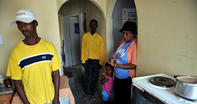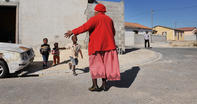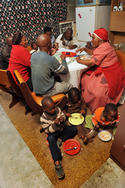Xhosa Culture Post Funeral

After my husbands funeral, my mother took Anthony my son to Gugulethu with her because I had to go back to the Eastern Cape. In Xhosa culture, when your husband dies you have to go and live with his family for a year, and wear black for that period to show that you are in mourning.
When the year was over, I asked to go back to Cape Town to work to make money for my six children. I left them in the Eastern Cape and worked and worked in Cape Town as a domestic worker, just as my mother had done. One day, a neighbour came to me and said my children were being abused back in Tsolo.
If the cows or sheep didn't come home, Kenneth would be beaten and he would run off to his special hiding place - a corner of the garden - and hide in the long grass. Only his sister, Phyllis, knew where he was and she never told anybody else.
Sometimes, the neighbour told me, the children weren't even allowed to go to school. And that was my main worry.
My children absolutely had to go to school. I had to make sure they were prepared for their future. A child who has an education has a much better chance in life, my mother used to say. 'Your father was a teacher and he had a better life because he had an education,' she told me.
Same Situations, Same Results

It may seem strange that I was abused by my extended family as a child, and now the same thing was happening to my children. It happened this way because our situations were the same. In our culture the mother and the children have a lower status than other family members if the child has no father, or the husband is not there.
'Mama, I can't stand this,' I told her. 'My children have to come to me.' I was a sleep-in domestic at the time, with a room at the back of the house where I worked in the suburb of Heathfield.
There was no space for my Children to live with me in that little room. For a while Anthony went to stay with my mother in Gugulethu, but my stepfather didn't like that. So that was when I built a shack in Philippi — so that I could be with my children.
Wild Boys

It was hard, bringing them up alone. They went wild, the boys especially. Anthony left school in Standard Seven, the second year of high school, and Kenneth in lower primary.
There were days when the children were older, when I would say to myself, 'If my husband was still alive, my children wouldn't be so naughty. The boys wouldn't be drinking and bunking school.' What a waste of their potential it was, really.
For example, I remember that Kenneth used to be so good at drawing and had such good handwriting. My boys could have done so much more.
By Jo-Anne Smetherham